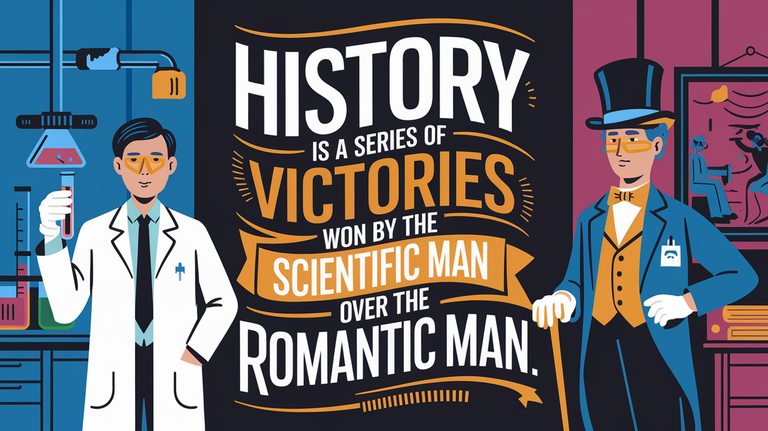The statement “History is a series of victories won by the scientific man over the romantic man” reflects the ongoing struggle between rationality and emotion, progress and tradition, facts and ideals. Throughout human history, there has been a constant tension between the scientific outlook—rooted in logic, empiricism, and reason—and the romantic perspective, which emphasizes imagination, emotion, and a reverence for nature and tradition. This essay explores how scientific thinking has often triumphed over romanticism in shaping the course of history. However, it also examines the contributions of romantic ideals to human culture and identity, and the need for a balance between the two.
The Rise of Scientific Thinking
The triumph of scientific thinking in history is undeniable. The scientific revolution of the 16th and 17th centuries marked a turning point in human civilization. Thinkers like Galileo, Newton, and Descartes challenged traditional views of the world, relying on observation, experimentation, and reason rather than on religious or mystical explanations. This era of rational inquiry laid the foundation for modern science and technology, transforming how humans understand the natural world.
Scientific advancements have led to incredible achievements, such as the discovery of electricity, the invention of vaccines, and the exploration of space. The industrial revolution, powered by scientific innovations, changed the course of history, leading to unprecedented economic growth and improved living standards. These accomplishments are seen as victories for the “scientific man,” whose approach to problem-solving has created practical solutions to humanity’s challenges.
For instance, the discovery of the germ theory of disease by Louis Pasteur revolutionized medicine, leading to breakthroughs in sanitation, vaccines, and antibiotics. These scientific advancements reduced mortality rates and significantly improved public health, demonstrating how the scientific approach has directly benefited human society. Similarly, the development of technology—from the steam engine to the internet—has shaped modern life, leading to a more connected, efficient, and advanced world.
The Romantic Man: Idealism and Emotion
In contrast to the scientific man, the romantic man is driven by ideals, emotions, and a deep connection to nature and tradition. Romanticism, which emerged as a reaction to the Enlightenment and the Industrial Revolution, emphasized the importance of individual expression, creativity, and the spiritual aspects of life. Romantic poets like William Wordsworth and Samuel Taylor Coleridge celebrated the beauty of nature and the emotions it evoked, while artists and writers embraced the idea of the sublime, the mysterious, and the transcendental.
The romantic man views the world not through the lens of cold logic but through the richness of human experience, intuition, and imagination. While the scientific man seeks to explain and control nature, the romantic man seeks to live in harmony with it, finding meaning in the natural world that goes beyond mere utility. Romanticism also places a strong emphasis on individuality and personal freedom, often critiquing the mechanization and dehumanization that come with industrial progress.
In this sense, the romantic man represents an idealistic vision of life, one that values beauty, emotion, and spiritual fulfillment. However, this worldview often struggles to compete with the practical successes of the scientific man. The romantic ideals, while inspiring, are often seen as impractical or naive in the face of real-world challenges.
Conflict Between Scientific and Romantic Approaches
The tension between scientific and romantic approaches can be seen throughout history, especially during periods of rapid technological advancement. The Industrial Revolution, for example, was a time when scientific and technological progress seemed unstoppable. Factories, steam engines, and mechanized production brought unprecedented economic growth, but also led to social upheaval, environmental degradation, and a loss of traditional ways of life.
Romantics like William Blake and John Ruskin criticized the Industrial Revolution for its dehumanizing effects. They mourned the destruction of nature, the exploitation of workers, and the alienation that came with industrialization. Blake’s poem “Jerusalem” famously describes England as a land of “dark Satanic mills,” a critique of the soulless mechanization that replaced the beauty and simplicity of rural life. For romantics, the scientific man’s victories often came at the cost of human happiness and spiritual fulfillment.
In the political realm, this conflict is evident in the tension between Enlightenment ideals and romantic nationalism. The Enlightenment, with its emphasis on reason, science, and universal human rights, paved the way for revolutions in America and France. These revolutions were driven by the belief in progress, rational governance, and the idea that society could be improved through reason and science.
However, the romantic reaction to these revolutions came in the form of nationalism, where people sought meaning not in universal principles, but in their unique cultural heritage, traditions, and identities. Romantic nationalism, as seen in the works of Johann Gottfried Herder, emphasized the importance of folk culture, language, and history. While the scientific man sought to create a rational, ordered world, the romantic man clung to the idea of individual and national uniqueness, resisting the homogenization that came with modernization.
The Triumph of Science in Modern History
In the modern era, science has continued to assert its dominance over romanticism in many aspects of life. The development of modern medicine, the advent of space exploration, and the rise of digital technology are all testaments to the triumph of scientific thinking. Global challenges such as climate change, pandemics, and energy crises are being addressed through scientific research and innovation, further cementing the role of the scientific man in shaping the future.
One of the most significant victories of the scientific man is in the field of medicine. Diseases that once devastated entire populations, such as smallpox and polio, have been eradicated or controlled through vaccination programs. The development of antibiotics, surgical techniques, and advanced diagnostic tools has improved life expectancy and quality of life for millions. These advancements reflect the power of scientific inquiry to solve some of humanity’s most pressing problems.
Moreover, the scientific man’s approach has been instrumental in addressing environmental challenges. While romanticism values a deep connection to nature, it is science that has provided the tools to understand and mitigate the impact of human activity on the planet. Climate change, for example, is a problem that requires scientific solutions, such as renewable energy technologies, carbon capture, and environmental conservation efforts.
The Enduring Value of Romanticism
Despite the many victories of the scientific man, romanticism remains an essential part of human culture and identity. While science can explain how the world works, it cannot fully capture the richness of human experience—the emotions, dreams, and aspirations that define us as individuals. Romanticism, with its emphasis on emotion, art, and nature, reminds us of the importance of beauty, creativity, and meaning in our lives.
Romantic ideals continue to inspire art, literature, and philosophy. The environmental movement, for example, is deeply influenced by romantic ideas of living in harmony with nature. Conservationists like Henry David Thoreau and John Muir drew on romanticism’s reverence for the natural world, advocating for the preservation of wilderness areas and the protection of the environment.
In the realm of personal fulfillment, romanticism offers a counterbalance to the cold logic of scientific rationality. It reminds us that not everything in life can be measured or quantified. The pursuit of happiness, love, and meaning often requires us to embrace our emotions and dreams, even when they defy logic.
Read More: Poets Are the Unacknowledged Legislators of the World
Finding a Balance
Ultimately, history is not just a series of victories by the scientific man over the romantic man, but a continuous negotiation between the two. Both perspectives offer valuable insights into the human condition. While science provides the tools for progress and innovation, romanticism enriches our understanding of what it means to be human. A society that embraces both rationality and emotion, progress and tradition, is likely to be more balanced and fulfilled.
In conclusion, while the scientific man has won many victories in the course of history, the romantic man still plays a crucial role in shaping our culture, values, and identities. The tension between these two worldviews is not one of outright victory, but rather a dynamic interplay that continues to define the human experience. Both are essential in their own ways, and history shows us the importance of maintaining a balance between the two.







